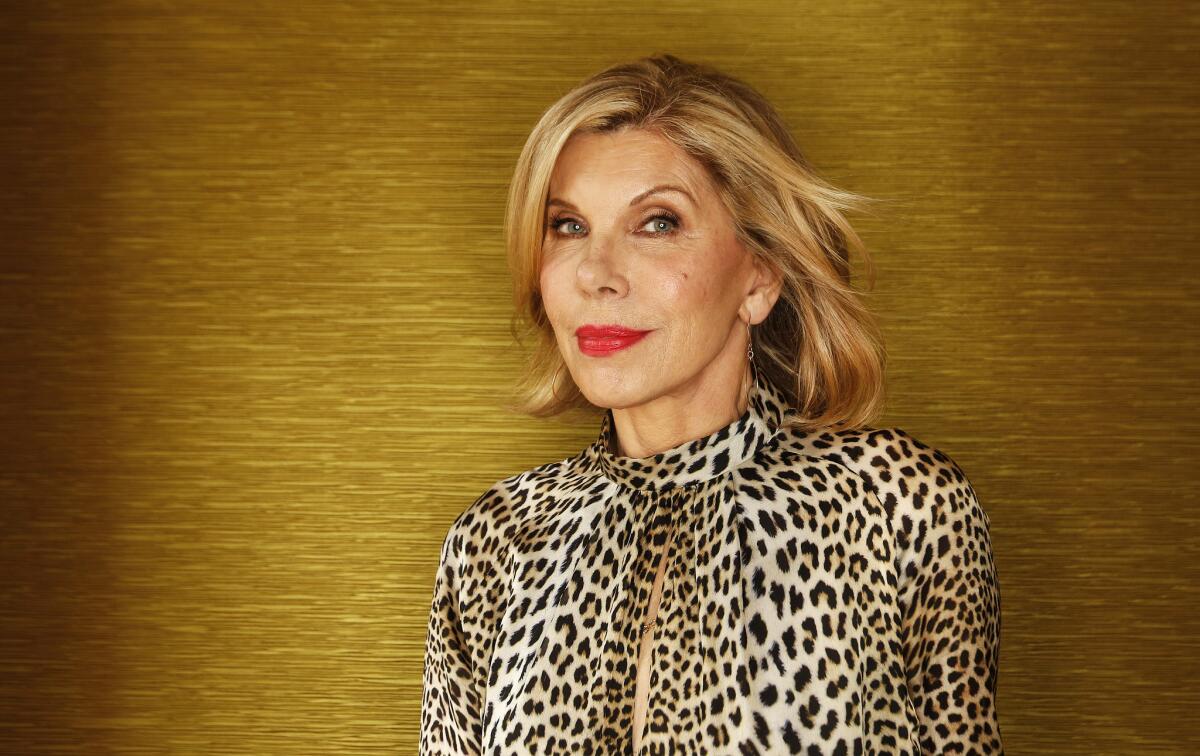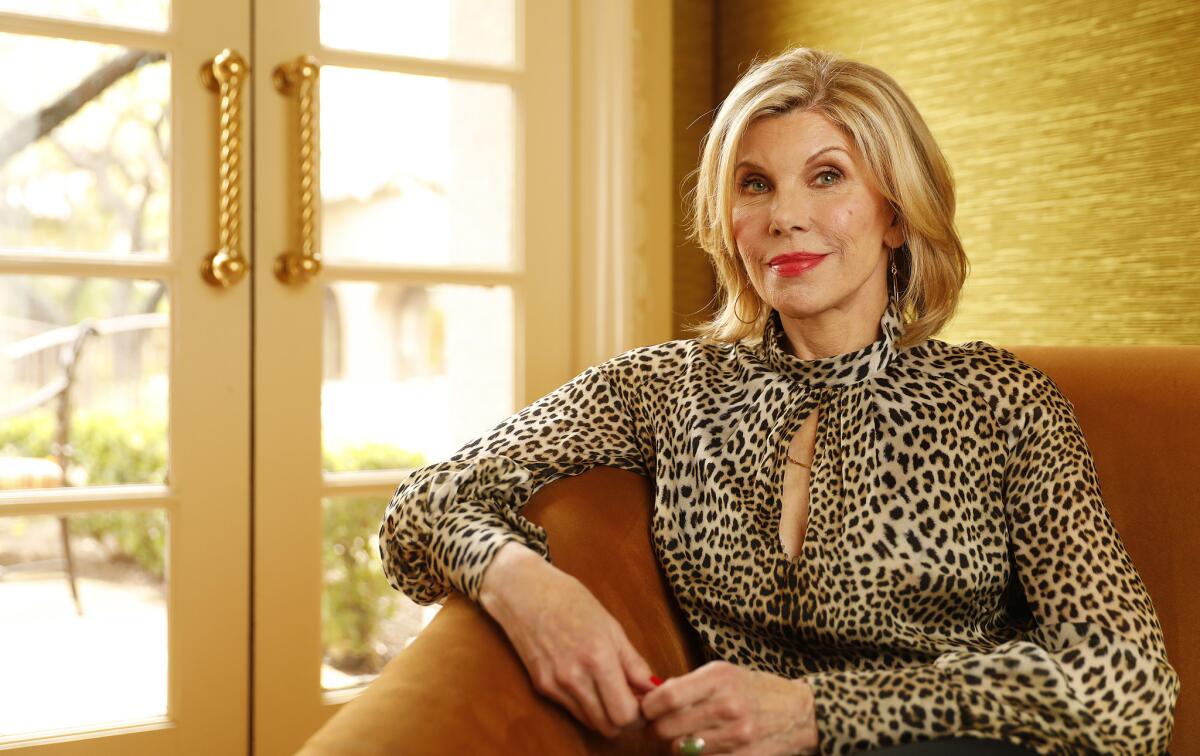Christine Baranski on Les Moonves and ‘The Good Fight’s’ unapologetic Trump resistance

There’s a lawyer on TV who would like to live in a world where Donald Trump isn’t president. And it’s not Michael Cohen.
Christine Baranski has established a strong career in TV, film, and theater — decked out with credits such as “Birdcage,” “Bulworth,” “Chicago,” “Mamma Mia” and her Emmy-winning role on the CBS sitcom “Cybill.” But her role as high-powered lawyer Diane Lockhart — introduced in CBS’ “The Good Wife” and carried over to its spinoff “The Good Fight” on CBS All Access — has been the one she’s played the longest. And these days, it’s one she relates to on a real-world level.
Created by Robert and Michelle King, “The Good Fight” — much like its predecessor, which earned Baranski six of her 14 Emmy nominations — is a legal drama that mixes cases of the week, often timely ones, with the personal and professional goings-on of its central characters. Then there’s the ongoing story line that revolves around Diane, an avowed liberal feminist, and her obsession with the outcome of the last election.
“What is happening seems so absurd, as though the world is turning on its axis,” Baranski says during a recent sit-down in Pasadena. “You don’t know how to process the anger. You don’t know how to express it. You don’t know where to go. Do you scream at the television set? Do you go to a resistance group in someone’s basement? Do you march? What do you do? It’s a dilemma for so many people, and so playing this character for me is, I think, cathartic.”
Much of last season tended to Diane spiraling from the state of affairs living in a Trump world — she was angry, she was frustrated, she was dropping curse words while walking barefoot in the office. When the third season launches March 14 on CBS All Access, Baranski says viewers will find her character more purposeful in the way she manages her feelings.
You’re heading into your 10th year playing this character.
I know! And yet, the character is more energized than ever; this show made this transition for her. I’m always in awe of Diane’s ability to cope and articulate what’s going on and I think she’s speaks for a lot of women, which is why I think she’s something of a role model or a heroine.
Diane, 10 years ago, was a head at the law firm. She was the woman, who along with Will Gardner, was in the room where it happens. She was always a powerful, well-educated woman who claimed power, who didn’t apologize for her power, her legitimacy. She never apologized for her gender, her age. She never made excuses. She was well-spoken, well-dressed.
Was she a victim? She was a victim of circumstance but she wasn’t ever portrayed as a victim, which I always thought was so wonderful that the Kings wrote that character.
It just so happens that Diane has moved into position as the lead on the show just as the culture is embracing women like Diane Lockhart, who’ve been around for a long time, have decades of experience, they can go toe-to-toe with the men, and they’re wielding power or they’re demanding power. It’s a great moment for Diane Lockhart to be out in the culture.
RELATED: ‘Good Wife’ spinoff engages in ‘The Good Fight’ — on the Donald Trump front »
“The Good Fight” is one of TV’s few scripted shows unapologetically set in today’s world, in this Trump era. Do you pull from what you’re feeling?
As an artist, as an actor, I just feel so fortunate that I can bring who I am as Christine into the workplace, transmogrifying my feelings, my thoughts, into Diane and live the life that we’re living now. It would be very strange to be on a show that’s about something fictional, that has no relationship to this moment in time. Because this moment in time is so compelling, it’s so strange. It’s as though the wheels are off; it’s as though it’s spinning off the axis.
People are trying to process or hold on, and it’s as though somebody pushed the delete button and we’re just sliding off a screen. It centers you, because you get to play the moral dilemma of our time.
Diane’s aspirational and sophisticated fashion aesthetic is impossible to miss. How much does it inform how you play her?
Dan [Lawson, the show’s costume designer] and I always talk about it as her armor — her hair, her makeup, her clothes, her jewelry. It’s what she puts forth in the world. I loved when they started talking about Nancy Pelosi’s pink coats. But you know what, when she walked out of the White House and her hair was blowing, and she wore that coat, it was like her armor.
It’s something that women have in the way that men have had their well-tailored suits. It’s a statement, it says here I am, in the way that when you open your mouth and speak, the way in which you speak says, this is who I am.
And how you articulate your thoughts, everything speaks to character. We live in a very visual age, so if the first thing you see is Diane Lockhart walking down the hall in some incredible Akris suit with her hair and makeup perfectly in place, it says, “I’m ready for the world, bring it on!”

The show is talked about for its prescience and timeliness, tackling subjects in the news. Last season had a couple of #MeToo-themed episodes. How was it, as an employee, to see what unfolded with the allegations against now-fired CBS head Les Moonves?
Well, I have many emotions, particularly since I have worked for CBS for decades. Leslie introduced himself, my second season on “Cybill,” saying, “I don’t know if you remember me, but I handed you your paycheck back when I was working at Playwrights Horizons.”
He worked in the production office. And he handed me a paycheck for about, oh I don’t know, was it $120 a day, this was back in the late ’70s, early ’80s? I was a young actress, it was the first show I did that I got a good review — I got noticed for it.
My relationship with Leslie goes way back. I know [his wife] Julie [Chen], you know. [He] was a boss I cared about. I have a long history with him. So there was shock, but there was also a deep sadness, because I think many people think that CBS felt a great sadness for how it all evolved, and empathy for those who had suffered. So it’s complicated.
You’re known for playing women that stand in their power one way or another; they make no apologies for being sexual, for being feisty, for being sharp.
I’ve gotten cast that way. When I was at Juilliard, I played a lot of different roles. I also, for better or worse, was never cast as the beautiful young ingénue. I’ve always been more the sassy best friend, which is why “Cybill” was such a slam dunk for me.
Those are roles of women who didn’t rely on their beauty. They relied on their cleverness, their intelligence, their moxie. It was part of my language as an actress from the time I was in my early 20s. It’s not that I thought I was unattractive — I would get cast playing sexy women. But not like the beauty, never the lead. I would lose roles because I wasn’t that leading-lady type. That said, here I am talking to you. I am the age that I am, and I’m still ...
Saying lines like, “Be still my beating vagina.”
I know, who gets to say that at any age?
REVIEW: The familiar takes a few twists in ‘The Good Fight’ »
We’ll be seeing you sing on this season of “The Good Fight” to Prince’s “Raspberry Beret” with Audra McDonald — tell us everything.
I just thought it was fun. The Kings had scripted it as ”they hum under their breath” — and then I hum it, and then she hums it, and then we start singing along. It’s really a moment when two colleagues are just working together late at night in an office, and they realize they both know and love the song, and we just start singing it. Audra and I both really said, “Look we can’t sell this [as humming], we’re stepping out of the show and having an Audra-Christine, doing a benefit,” you know?
What’s your karaoke pick?
If I want to have the ultimate high, it would be Diana Ross singing “Ain’t No Mountain High Enough.” That key change.
I mean my makeup artist knows that on a Friday, with the long hours, there are a few songs — she just puts them on, like, Martha & the Vandellas’ “Dancing in the Street,” “Ain’t No Mountain High Enough,” and probably “What’s Going On” by Marvin Gaye.
May I ask, what was your ice breaker when working with Cher on “Mamma Mia! Here we Go Again”?
Sadly, we really only had one scene where Cher and I talked to each other. Cher is such a girl girl. She’s very down to earth. You lob a question at her or, like I did, say, “I was a pimply girl in Buffalo and you were the coolest woman on the planet.” She’d just take that and say, “Well, you know, I brought all my costumes. We didn’t have any money.” She’s so self-effacing.
There is a photo of all the women in the cast of “Mamma Mia” plus [creator-producer] Judy Craymer all lined up — I have to get it from Judy. I’m in a photograph with Julie Walters and Cher and Meryl Streep. It’s just like, “OK, I guess I’ve arrived.”
Twitter: @villarrealy
More to Read
The complete guide to home viewing
Get Screen Gab for everything about the TV shows and streaming movies everyone’s talking about.
You may occasionally receive promotional content from the Los Angeles Times.







